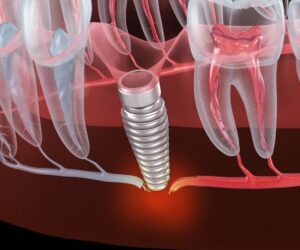
You’re flying high after getting dental implants – you’ve regained a sense of confidence that you didn’t know was missing! Of course, you want this feeling to last as long as possible. From a financial perspective, you want a good return on your costly new investment, too. To make this happen, you’ll need to develop good oral and lifestyle habits. Avoid these practices to get the most out of your new implants.
Reduce Your Alcohol Intake
After your dental implant surgery, it will take about 3 to 6 months for osseointegration to complete. This is the process where your dental implant fuses with the surrounding jawbone, and drinking alcohol during this period can interfere with the fusion of bone and implant. You don’t want alcohol to be the reason for an unsuccessful implant!
After the implant site has completely healed, you can resume drinking alcohol, but drink in moderation. Excessive alcohol intake can lead to dry mouth, which could reduce your saliva flow and result in tooth decay, gum disease, and implant failure.
Avoid Cigarette and Tobacco Use
Like alcohol, smoking cigarettes can impact recovery during osseointegration. Nicotine constricts blood vessels, limiting oxygen and nutrient delivery to the gums and jawbone. Smoking also weakens the body’s immune system, which could result in contracting viruses or infections, including around the implant site.
Tobacco use, like chewing tobacco, significantly increases the chances of inflammation of the tissues around the implant site, which can lead to bone loss and, ultimately, implant failure.
Be Careful of Certain Foods During Your Recovery
Crunchy, hard, or sticky foods can dislodge implants. You’ll want to stick to foods like macaroni and cheese, oatmeal, yogurt, and scrambled eggs, especially during the recovery period.
If you’re going to eat hard foods like tough meat or raw vegetables, cut your food into small bites to avoid biting directly into a hard surface; doing so could damage your implants.
Once implants are placed, patients should be able to freely eat most foods!
Protect Yourself With a Mouthguard
If you play contact sports, wear a mouthguard to add an extra layer of protection to your mouth. Mouthguards will absorb the impact of blows to your mouth, ensuring your new implants stay in place.
Bruxism, or the involuntary clenching or grinding of the teeth, often occurs at night. If you’ve noticed that you wake up with a headache or jaw pain, you may want to consult your dentist to see if you grind your teeth in your sleep. Wearing a mouthguard can prevent damage caused by teeth-grinding.
Do any of these habits look familiar? If so, you’ll want to kick them to ensure the longevity of your new implants!
About the Practice
Our team at Main Street Family Dental Danville can see to all your implant needs, from your initial consultation to aftercare of your restoration. Need other dental care? Our other services range from pediatric to restorative to cosmetic dentistry, among others. Visit our website today to make your appointment or call our Danville office at (925) 575-8878.
